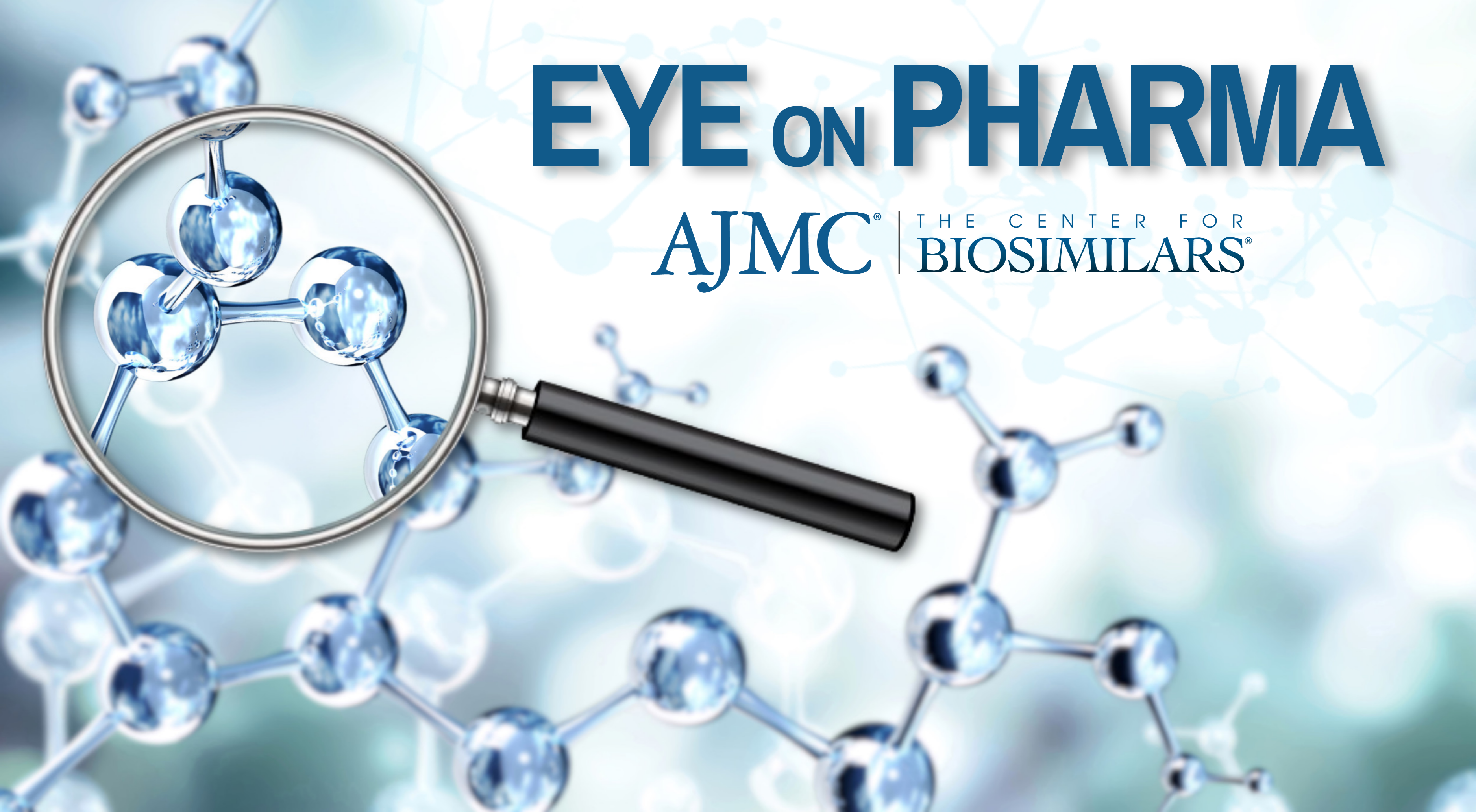- Bone Health
- Immunology
- Hematology
- Respiratory
- Dermatology
- Diabetes
- Gastroenterology
- Neurology
- Oncology
- Ophthalmology
- Rare Disease
- Rheumatology
Eye on Pharma: Aflibercept Legal Drama; PBM, Humira Biosimilars; Denosumab Regulatory Review
Regeneron appeals legal decision after judge refuses to block an aflibercept biosimilar; Prime Therapeutics, a pharmacy benefit manager (PBM), becomes the latest to offer biosimilars referencing Humira (adalimumab) at a low cost; the FDA and European Medicines Agency accept a denosumab biosimilar candidate for review.
Regeneron appeals legal decision after judge refuses to block aflibercept biosimilar; Prime Therapeutics, a pharmacy benefit manager (PBM) becomes the latest to offer biosimilars referencing Humira (adalimumab) at a low cost; the FDA and European Medicines Agency (EMA) accept a denosumab biosimilar candidate for review.

Aflibercept Legal Drama
A federal judge in West Virginia has ruled that Regeneron cannot immediately block Amgen's US sales of a biosimilar version of Eylea (reference aflibercept), its highly successful eye-care drug.1 Regeneron had accused Amgen’s proposed biosimilar, Pavblu (adlibercept-ayyh), of infringing on multiple patents related to Eylea and sought a preliminary injunction to halt its launch. However, US District Judge Thomas Kleeh rejected Regeneron’s request, allowing Amgen to proceed with its plans to bring the biosimilar to market.
Eylea, which treats conditions such as macular degeneration, diabetic retinopathy, and macular edema, generated $5.89 billion in US sales for Regeneron in 2023. The decision caused Regeneron's stock to drop by 4.6% in a single day. While the judge's decision remains under seal, Regeneron expressed disappointment and announced plans to appeal.2 Despite the setback, Regeneron noted that the ruling does not affect its previous legal victories against other companies seeking to develop Eylea biosimilars.
Amgen, whose biosimilar Pavblu was approved by the FDA in August 2024, expressed satisfaction with the court's decision and plans to announce its launch timeline soon. Regeneron had originally filed its lawsuit against Amgen in California federal court in January 2024, but the case was transferred to West Virginia in April.
The legal battle is part of Regeneron’s broader efforts to defend Eylea from biosimilar competition, which could significantly impact its market share.
PBM to Add Humira Biosimilars to Plans
Prime Therapeutics announced new cost-effective biosimilar solutions for Humira, offering clients flexible strategies and financial risk mitigation to maintain access to biosimilars for millions of Americans.3 Starting in 2025, Prime will recommend 4 manufacturers for biosimilar options: Organon (Hadlima; adalimumab-bwwd), Teva (Simlandi; adalimumab-ryvk), Sandoz (unbranded adalimumab-adaz), and Celltrion (unbranded adalimumab-aaty). Clients can choose between parity with Humira, biosimilars-first, or biosimilars-only strategies, with biosimilars priced as low as $500 to $600 per 30-day supply.
Prime is the latest PBM to increase accessibility to adalimumab biosimilars, following companies like Smith Rx, Evernorth, CVS Caremark, and GoodRx.
Denosumab Biosimilar for Regulatory Review
Alvotech and its partner Teva Pharmaceuticals announced that the FDA and EMA has accepted its marketing authorization application for AVT03, a biosimilar candidate to Prolia and Xgeva (denosumab).4,5
Prolia is used to treat osteoporosis in postmenopausal women and men at high risk of fractures, and Xgeva is prescribed to prevent bone complications in adults with advanced cancer that has spread to the bones. By introducing AVT03, Alvotech aims to increase patient access to these treatments at potentially lower costs.
AVT03 was developed and manufactured by Alvotech, while its commercialization rights in Europe, including Switzerland and the UK, will be handled by partners STADA Arzneimittel AG and Dr. Reddy’s Laboratories SA under semi-exclusive agreements. Teva Pharmaceuticals owns the commercialization rights in the US.
In July 2024, Alvotech reported positive topline results from a pivotal study (AVT03-GL-C01) involving 532 postmenopausal women with osteoporosis, which confirmed the clinical similarity of AVT03 to Prolia in terms of efficacy, safety, immunogenicity, and pharmacokinetics (PK). Two additional studies (AVT03-GL-P01 and AVT03-GL-P03) also met their primary endpoints, demonstrating comparable PK, safety, and tolerability of AVT03 to Prolia and Xgeva in healthy participants.
References
1. Brittain B. Amgen gets early win in Regeneron lawsuit over Eylea biosimilar. Reuters. September 24, 2024. Accessed October 15, 2024. https://www.reuters.com/legal/litigation/amgen-gets-early-win-regeneron-lawsuit-over-eylea-biosimilar-2024-09-23/
2. Yasiejko C. Regeneron appeals after judge declines to block amgen biosimilar. Bloomberg Law. September 23, 2024. Accessed October 15, 2024. https://news.bloomberglaw.com/ip-law/regeneron-fails-to-block-amgens-eylea-biosimilar-files-appeal
3. Prime Therapeutics announces new, cost-effective Humira® biosimilar solutions, offering clients flexibility and choice. Prime Therapeutics. Press release; October 7, 2024. Accessed October 15, 2024. https://www.prnewswire.com/news-releases/prime-therapeutics-announces-new-cost-effective-humira-biosimilar-solutions-offering-clients-flexibility-and-choice-302269162.html
4. Teva Prolia® (denosumab) biosimilar candidate is accepted for review by U.S. FDA and EU EMA. Teva Pharmaceuticals. Press release; October 8, 2024. Accessed October 15, 2024. https://finance.yahoo.com/news/teva-prolia-denosumab-biosimilar-candidate-110000901.html?guccounter=1&guce_referrer=aHR0cHM6Ly93d3cuZ29vZ2xlLmNvbS8&guce_referrer_sig=AQAAADHhTj1JZpheOYHQPIjYXVoJZ47GjBwDmYaWrNIeN8Lg5SmfomNBX3KwqBLYbnto2PlIiGrTrg5DGM1XKrNh16GtoO5bqGFy2SBtpKjFeKSltf1Yos6-Co25Wr1OCptuX7OL2Qa6CQ6-9u2A2LXWTHTXzjXxbV2ZtqRL6p_xJfp3
5. European Medicines Agency confirms acceptance of marketing application for AVT03, a proposed biosimilar to Prolia® and Xgeva®. Alvotech. Press release; October 10, 2024. Accessed October 15, 2024. https://www.globenewswire.com/news-release/2024/10/10/2961081/0/en/European-Medicines-Agency-Confirms-Acceptance-of-Marketing-Application-for-AVT03-a-Proposed-Biosimilar-to-Prolia-and-Xgeva.html
Newsletter
Where clinical, regulatory, and economic perspectives converge—sign up for Center for Biosimilars® emails to get expert insights on emerging treatment paradigms, biosimilar policy, and real-world outcomes that shape patient care.
